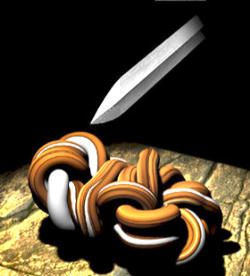 ON CLARITY OF SPEECH
ON CLARITY OF SPEECHNon vaco ad istas ineptias; ingens negotium in manibus est! ... Nam ut ait ille tragicus, "Veritatis simplex oratio est." Ideoque illam inplicare non oportet; nec enim quicquam minus convenit quam subdola ista calliditas animis magna conantibus.
"I have no leisure for this sort of stupidity [i.e. sophistry]; the work at hand is of colossal import! ... As the tragic poet says: 'The language of truth is simple.' [Euripides Phoenissae, 469] We should not, therefore, make such language into a ball of snakes! There is nothing less fitting for a soul of great endeavour than this crafty sort of cleverness."
-Seneca's Moral Epistle XLIX
I can't speak from experience about everybody's church body, but I can say with some authority that my own is plagued with sophistry. Every church body and congregation has its share of disagreements over issues of both greater and lesser import. Some may argue over the ordination of women, while others are simply arguing about what color the carpet should be in the sanctuary. This is not in any way a criticism of our various churches!
ARGUMENT IS GOOD!
Argument is a method we use to seek and reveal truth in community. I have actually heard people argue (ironically) that Jesus himself never argued, because arguing is sin. This is truly laughable, since this same Jesus had no qualms calling his opponents to task in public, denouncing them as "sons of the devil," and "brood of vipers." The argument (even polemical rhetoric) was not aimed at covering up falsehood, however, but rather exposing the truth. Jesus did not argue from a position of anger or insecurity. He condescended to engage in argument with people in order to carefully show them the truth.
Argument in our churches is very good, since as Seneca points out, the task at hand is of colossal import - the confession of the Incarnate Truth and the search for a life in concert with that Truth. Our confessions of faith themselves (minimally - the three ecumenical creeds of orthodox Christendom) were forged in the fires of truth-seeking, clarifying, and falsehood-excluding argument. This is good.
Argument is good. Sophistry is bad. As a Stoic, Seneca believes in the power of reason and logical argument. Sophistry, masquerading as such argument, is like the antiChrist of reason and logic. Sophistry and word-play does not seek to unmask falsehood and discover truth. Sophistry does not "put all the cards on the table" for fair discussion. Sophistry instead uses twisted logic, double-entendre, open language, and many other tools to hide falsehood, prevent open and fair argument, and to bury the truth. It seeks to make a "ball of snakes" of discussion to the end that every path of inquiry leads to a dead-end. Sophistry ends healthy argument.
Nothing is so hateful to the truth as sophistry. It aims at making patent falsehoods seem true, and those who resort to it might have earned themselves Jesus' condemnation as "children of the devil," the father of lies.
Why do people who otherwise love truth fall into the habit of sophistry? While there may be any number of reasons, ranging from Satanic love of confusion and lies to innocent logical fallacy, most sophistry seems rooted in insecurity and pride. When legitimate argument invites all parties to openly and honestly enumerate their points and "put all the cards on the table," sophistry provides a back-door for the insecure who are afraid their "cards" won't measure up. Here can already be seen pride peeking in, because a true searcher after truth is more concerned with finding truth than being justified in his/her own position. Sophistry is the tool of those who haven't the humility to say, "Maybe I could be wrong, but let's do find the truth - that's the important thing."
It is to every one of us that Seneca says: "There is nothing less fitting for a soul of great endeavour than this crafty sort of cleverness." Our endeavour is truly greater than anything Seneca's Stoicism could have imagined, and so where Seneca's naked pagan reason can value fair argument so highly and hate sophistry so powerfully, how much more should we Christians love and value fair and clear argument and despise sophistry as itself the despiser of Truth?
-Lucilius
"This is the verdict: Light has come into the world, but men loved darkness instead of light because their deeds were evil. Everyone who does evil hates the light, and will not come into the light for fear that his deeds will be exposed. But whoever lives by the truth comes into the light, so that it may be seen plainly that what he has done has been done through God."
-St. John's Gospel (3:19-21, ESV)
Seneca's writings are available from Harvard University Press' Loeb Classical Library: http://www.hup.harvard.edu/loeb/
No comments:
Post a Comment